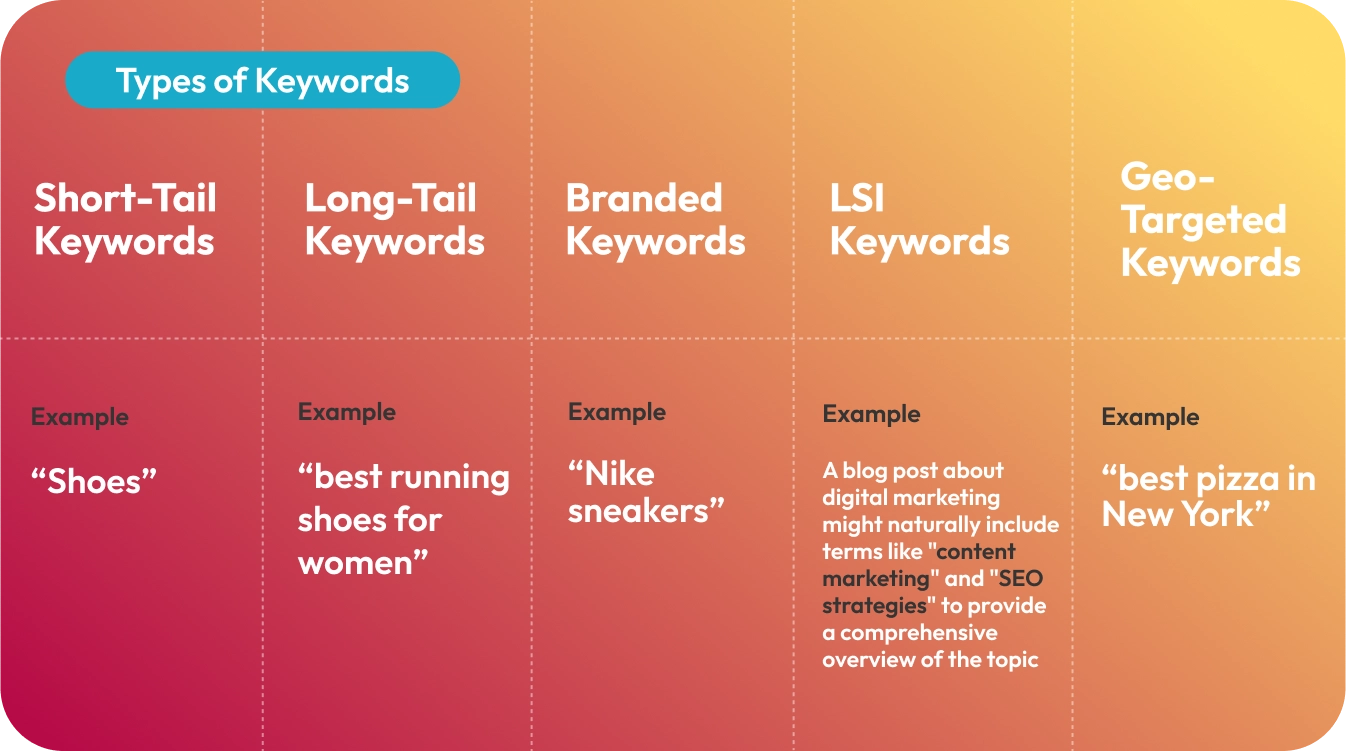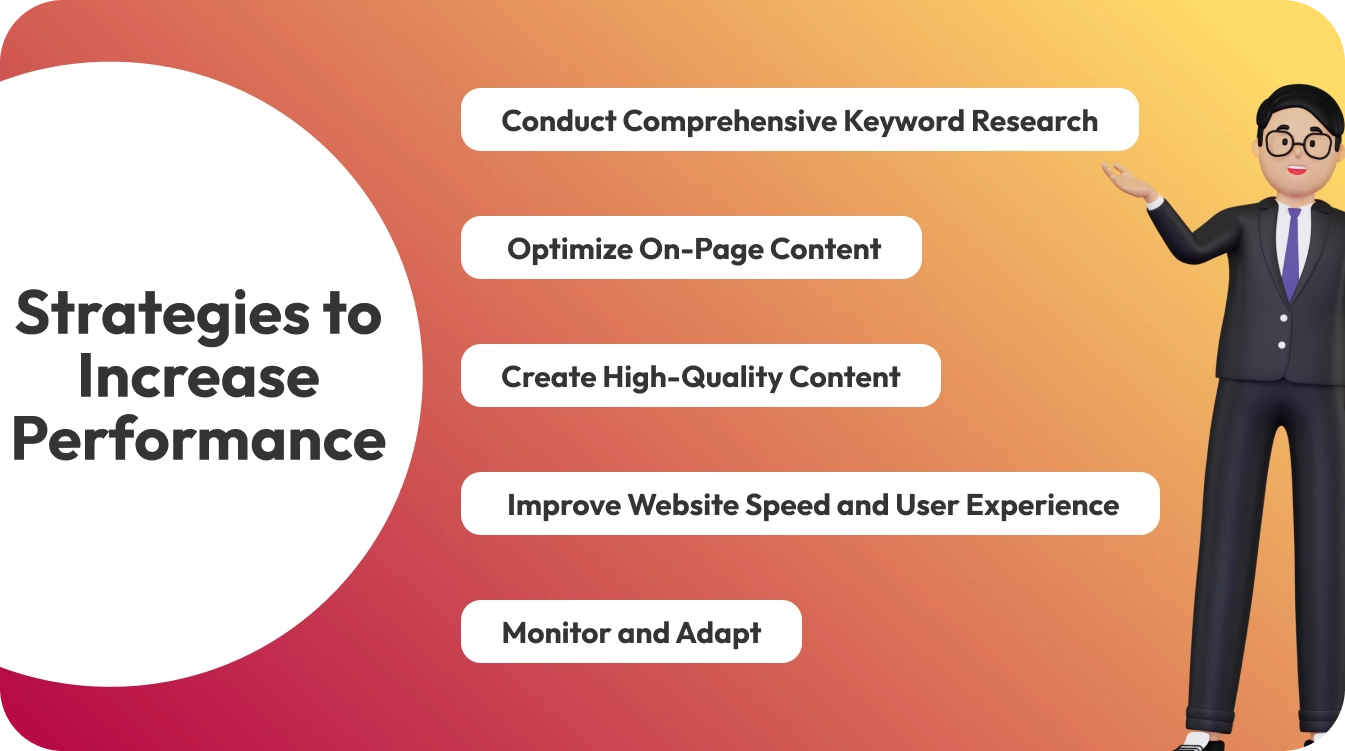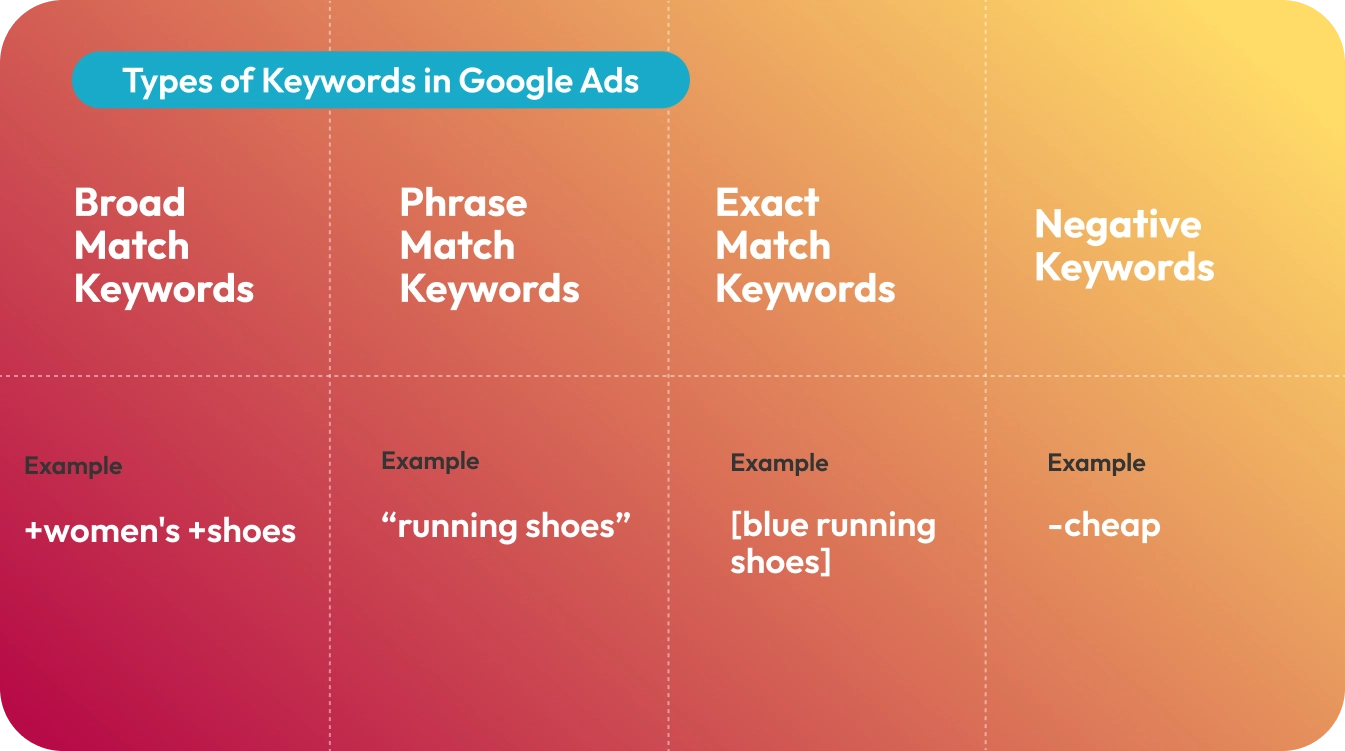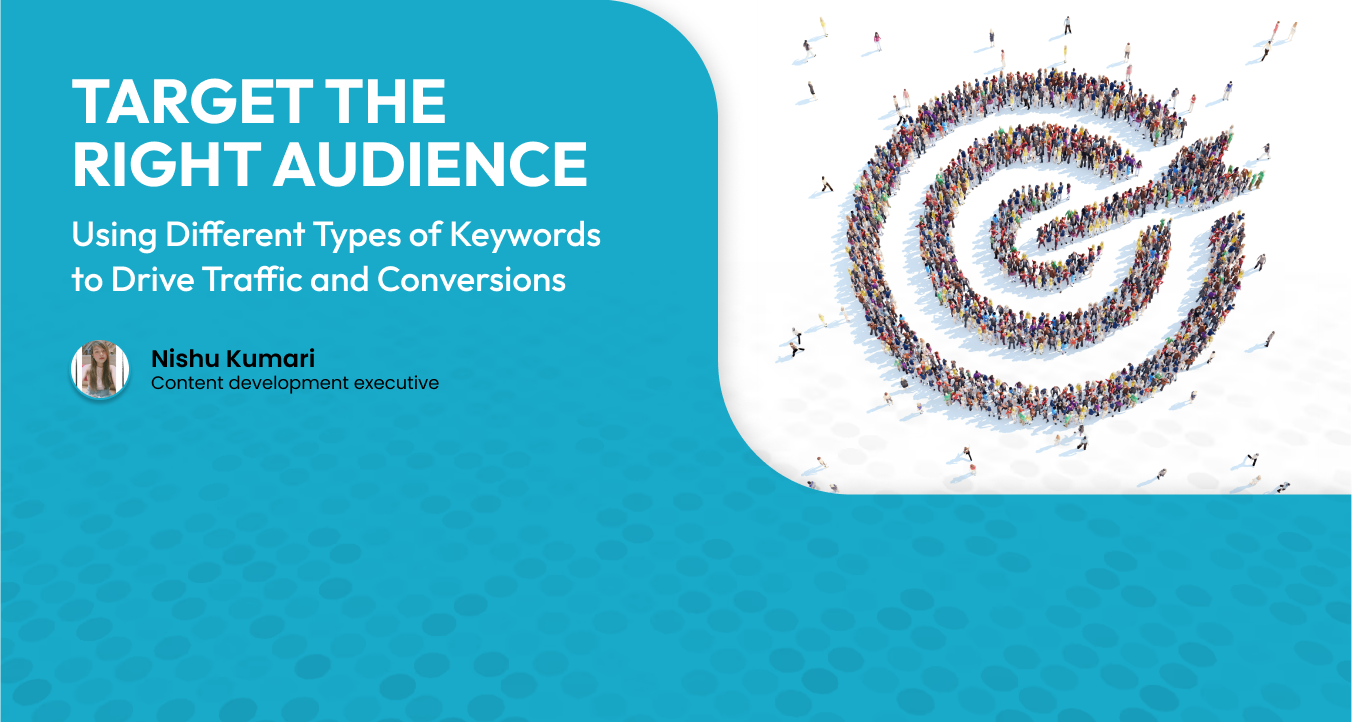In the world of digital marketing, knowing your keywords inside out is crucial for making the most of your online presence. Whether you're working on getting your website seen through Search Engine Optimization (SEO) or trying your hand at Google Ads, understanding the different types of keywords in SEO and Google Ads can make a big difference in how well you do.
What are SEO Keywords?
SEO keywords are the specific words or phrases that people use when searching for products, services, or information online. They are also the terms that search engines use to rank and organize content on the web. The goal of optimizing your web content around these keywords is to attract more visitors to your website, potentially leading to increased sales and conversions for your business.
For instance, if someone is looking to purchase new shoes, they might type in a search query like "men's casual shoes" on Google. Even though this query consists of multiple words, it still represents a keyword.
When selecting and using SEO keywords, the aim is to ensure that they align with the search queries of your target audience and how search engines interpret and categorize your website. When your website ranks higher in search results for relevant keywords, such as "men's casual shoes," you can expect to receive more visibility and traffic from potential customers interested in your offerings.
Why are Keywords Important in SEO?
SEO keywords play a vital role in connecting you with your desired audience when they seek information related to your business online. Selecting and utilizing the correct keywords is fundamental for the success of any SEO strategy, as they need to align with your overall business objectives.
Attaining a higher ranking on the Search Engine Result Page (SERP) can significantly increase the flow of relevant traffic to your website. Therefore, identifying keywords that people commonly search for is the initial step in any SEO.
Keywords serve as the foundation of SEO efforts. Once you've compiled a list of suitable keywords, you can commence essential SEO activities, including:
- Organizing your website's structure effectively
- Enhancing landing pages and sales content
- Crafting engaging content for blog posts and YouTube videos
- Strategizing product and category page optimizations
What is the Role of Keywords in SEO?
Keywords play a crucial role in SEO, serving as the fundamental element that drives the success of any search engine optimization strategy.
The reasons are:
1. Connecting Users with Relevant Content:
Keywords help search engines understand the content of web pages and match them with users' search queries. When users type in specific keywords, search engines strive to present them with the most relevant and helpful results.
2. Improving Search Engine Ranking:
Websites that effectively incorporate relevant keywords into their content are more likely to rank higher in search engine results pages (SERPs). This higher visibility increases the chances of attracting organic traffic to the website.
3. Targeting Specific Audiences:
By targeting specific keywords related to their products, services, or industry, businesses can attract users who are actively seeking information or solutions within their niche. This targeted approach increases the likelihood of converting visitors into customers or leads.
4. Enhancing User Experience:
Well-optimized content that incorporates relevant keywords provides value to users by addressing their search intent and delivering useful information. This positive user experience can lead to longer engagement periods, lower bounce rates, and an increased likelihood of return visits.
5. Guiding Content Creation and Optimization:
Keyword research informs content creation strategies by identifying the topics, themes, and phrases that are relevant and in demand within a particular industry or market. By strategically incorporating these keywords into various elements of their website, businesses can optimize their content for both users and search engines.
Types of Keywords in SEO

Keywords are the backbone of SEO, serving as the bridge between user intent and content relevance. In essence, keyword types categorize the various ways users express their queries, allowing marketers to tailor their content accordingly. Here are the primary keyword types in SEO:
1. Short-Tail Keywords:
These are short and general keywords that typically consist of one or two words. They capture a broad audience but may not be very specific. For example:
- Keyword: "shoes"
- Example: A shoe store might use "shoes" as a short-tail keyword to attract a wide range of potential customers interested in footwear.
2. Long-Tail Keywords:
These are longer and more specific phrases, usually containing three or more words. They target a narrower audience but often indicate stronger intent. For example:
- Keyword: "best running shoes for women"
- Example: An online retailer specializing in athletic wear might use "best running shoes for women" as a long-tail keyword to attract female runners looking for specific products.
3. Branded Keywords:
These keywords include the brand name or variations of it. They help people find your specific products or services when they're already familiar with your brand. For example:
- Keyword: "Nike sneakers"
- Example: The official Nike website might use "Nike sneakers" as a branded keyword to ensure that people looking for Nike shoes find their products directly.
4. LSI Keywords (Latent Semantic Indexing):
These are terms related to your main keyword that help search engines understand the context of your content. They're not synonyms but words that often appear together in similar contexts. For example:
- Main Keyword: "digital marketing"
- LSI Keywords: "content marketing," "social media advertising," "SEO strategies"
- Example: A blog post about digital marketing might naturally include terms like "content marketing" and "SEO strategies" to provide a comprehensive overview of the topic.
5. Geo-Targeted Keywords:
These keywords include location-specific terms, which are crucial for businesses targeting local audiences. They help ensure that your content or business shows up in searches for specific locations. For example:
- Keyword: "best pizza in New York"
- Example: A local pizzeria in New York City might use "best pizza in New York" as a geo-targeted keyword to attract customers searching for pizza nearby.
Strategies to Increase Website Performance

Now that we've explored the different types of keywords in SEO, let's delve into strategies to enhance your website performance:
1. Conduct Comprehensive Keyword Research:
Begin by conducting thorough keyword research to identify relevant terms and phrases aligned with your target audience's interests and search intent. Utilize tools like Google Keyword Planner, SEMrush, or Ahrefs to uncover valuable insights into search volume, competition, and user behavior.
2. Optimize On-Page Content:
Incorporate your target keywords strategically into your website's content, including headings, meta descriptions, and body text. Ensure that your content provides valuable information that satisfies user queries and aligns with search intent.
3. Create High-Quality Content:
Focus on creating high-quality, engaging content that addresses the needs and interests of your target audience. Valuable content not only attracts organic traffic but also encourages backlinks and social shares, boosting your site's authority and relevance.
4. Improve Website Speed and User Experience:
Enhance your website's loading speed and user experience to reduce bounce rates and improve engagement. Optimize images, leverage browser caching, and minimize unnecessary scripts to create a seamless browsing experience for visitors.
5. Monitor and Adapt:
Continuously monitor your website's performance and keyword rankings using analytics tools like Google Analytics and Google Search Console. Analyze user behavior, identify areas for improvement, and adapt your SEO strategies accordingly to stay ahead of the competition.
Types of Keywords in Google Ads
In addition to optimizing your website for organic search, understanding the types of keywords in Google Ads is essential for running successful ad campaigns. Here are the primary keyword types in Google Ads:

1. Broad Match Keywords:
These keywords trigger your ads to appear for searches containing variations, misspellings, synonyms, and related searches. They offer a wide reach but may also attract irrelevant traffic. For example:
- Keyword: +women's +shoes
- Example: An online shoe retailer using "+women's +shoes" as a broad match keyword might have their ads displayed for searches like "ladies' footwear" or "female sneakers."
2. Phrase Match Keywords:
These keywords trigger your ads to appear for searches containing the exact phrase or close variations of it. They offer a balance between reach and relevance. For example:
- Keyword: "running shoes"
- Example: A sports store using "running shoes" as a phrase match keyword might have their ads shown for searches like "best running shoes" or "running shoes for sale."
3. Exact Match Keywords:
These keywords trigger your ads to appear only for searches containing the exact keyword or close variants. They offer the highest level of relevance but may limit your reach compared to broader match types. For example:
- Keyword: [blue running shoes]
- Example: An online retailer specializing in blue running shoes might use "[blue running shoes]" as an exact match keyword to ensure their ads are displayed only for searches specifically for blue running shoes.
4. Negative Keywords:
These are terms or phrases for which you do not want your ads to appear. They help refine your targeting and improve the efficiency of your ad campaigns by excluding irrelevant searches. For example:
- Negative Keyword: -cheap
- Example: A luxury fashion brand might use "-cheap" as a negative keyword to prevent their ads from appearing for searches like "cheap designer handbags" or "discount luxury clothing."
In the dynamic realm of digital marketing, mastering the intricacies of keyword types is essential for maximizing your online visibility and success. By understanding the various keyword types in SEO and Google Ads and implementing strategic optimization techniques, you can elevate your performance, attract targeted traffic, and achieve your marketing objectives effectively. Embrace the power of keywords as your guiding compass in navigating the digital landscape and unlocking endless opportunities for growth and success.




